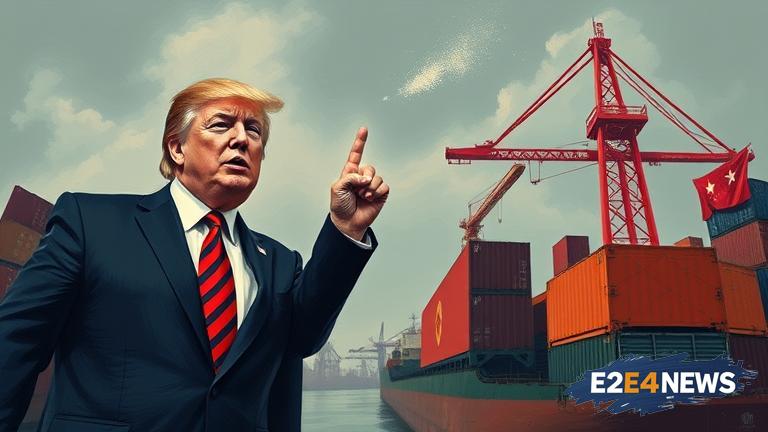The trade policies implemented by former US President Donald Trump have been a subject of intense discussion and analysis among economists and world leaders. Trump’s approach to trade has been characterized as unconventional and provocative, with some praising his efforts to renegotiate existing trade agreements and others condemning his use of tariffs as a tool for coercion. One of the key takeaways from Trump’s trade policies is the importance of understanding the complexities of global trade and the need for a nuanced approach that balances competing interests. Trump’s trade wars with China, in particular, have been closely watched, with some arguing that his tough stance has yielded significant concessions from Beijing. However, others have criticized Trump’s approach as overly aggressive and damaging to the global economy. Despite the controversy surrounding his trade policies, Trump has maintained that his approach has been successful in promoting American economic interests and creating jobs. The impact of Trump’s trade policies on the global economy has been significant, with some countries benefiting from the shift in trade patterns and others suffering losses. The use of tariffs as a tool for trade policy has been a key feature of Trump’s approach, with some arguing that it has been effective in protecting American industries and others criticizing it as a form of protectionism. The World Trade Organization (WTO) has played a crucial role in shaping the global trade landscape, and Trump’s policies have been subject to scrutiny and criticism from the international community. The WTO has warned that the increasing use of tariffs and trade restrictions could have devastating consequences for the global economy, and has urged countries to work towards a more cooperative and rules-based approach to trade. Despite these warnings, Trump has continued to pursue his trade agenda, arguing that it is necessary to protect American economic interests and promote fair trade practices. The response from other countries has been mixed, with some imposing retaliatory tariffs and others seeking to negotiate new trade agreements with the US. The European Union, in particular, has been critical of Trump’s trade policies, arguing that they are unfair and damaging to the global economy. However, other countries, such as Japan and South Korea, have been more receptive to Trump’s approach, and have sought to negotiate new trade agreements with the US. The impact of Trump’s trade policies on the US economy has been significant, with some industries benefiting from the protectionist measures and others suffering losses. The US agricultural sector, in particular, has been affected by the trade wars, with some farmers benefiting from the increased demand for American products and others suffering losses due to the retaliatory tariffs imposed by other countries. The US manufacturing sector has also been impacted, with some industries benefiting from the protectionist measures and others suffering losses due to the increased costs of imported raw materials. The debate over Trump’s trade policies is likely to continue, with some arguing that his approach has been successful in promoting American economic interests and others criticizing it as damaging to the global economy. As the global trade landscape continues to evolve, it is clear that Trump’s trade policies will have a lasting impact on the world economy. The use of tariffs and trade restrictions as a tool for trade policy is likely to continue, and countries will need to navigate the complex and often contentious world of global trade. The WTO will play a crucial role in shaping the global trade landscape, and countries will need to work towards a more cooperative and rules-based approach to trade. The future of global trade is uncertain, but one thing is clear: Trump’s trade policies have sparked a new era of debate and discussion over the best approach to promoting economic growth and development. The world will be watching closely as the global trade landscape continues to evolve, and countries will need to be prepared to adapt to the changing circumstances. The importance of understanding the complexities of global trade cannot be overstated, and countries will need to work towards a more nuanced approach that balances competing interests. The role of the WTO will be critical in shaping the global trade landscape, and countries will need to work towards a more cooperative and rules-based approach to trade. The use of tariffs and trade restrictions as a tool for trade policy will continue to be a subject of debate, and countries will need to navigate the complex and often contentious world of global trade. The impact of Trump’s trade policies on the global economy will be felt for years to come, and countries will need to be prepared to adapt to the changing circumstances. The future of global trade is uncertain, but one thing is clear: Trump’s trade policies have sparked a new era of debate and discussion over the best approach to promoting economic growth and development.
